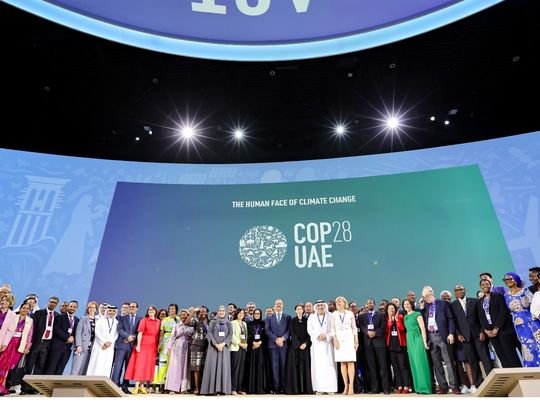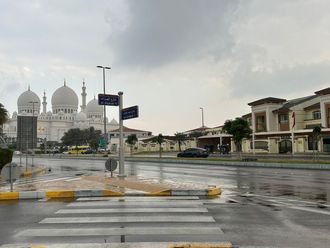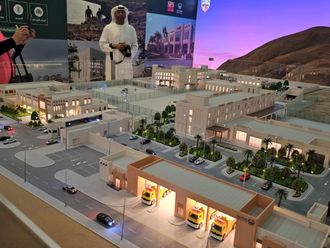
Dubai: The first Health Day at COP28 on Saturday, December 3, made a historic shift at the UN Climate Change Conference, acknowledging the critical intersection of health and climate. The UAE’s COP28 Presidency took a significant step in prioritising health, and focusing global audiences on protecting communities from the threats of climate change.
Addressing the Health Day Opening Session: Unpacking Political and Finance Commitments, Dr Tedros Adhanom Ghebreyesus, Director-General of the World Health Organisation (WHO), said the Health Day was well overdue: “For too long, health has been a footnote climate discussion. No more, after what we have seen starting today. I thank sincerely the UAE for taking this historic step and making health central to its COP28 Presidency. Thank you, UAE for being the pathfinder.”
John Kerry, US Climate Envoy, said: “The reality is the climate crisis and the health crisis are one and the same. Totally connected and totally converging at this moment in time.”
In the US, he said, during the summer, the largest cause of children hospitalised to the cost of about $55 billion a year minimum is environmentally-induced asthma. “That’s the quality of air.”
He added: “Climate action shouldn’t be measured only by Celsius degrees reduced, but by human lives saved.”
Meanwhile, Bill Gates, co-founder of the Bill and Melinda Gates Foundation, emphasised the key role of innovation in improving climate health. He also highlighted the need for investing in health innovations to fight diseases such as tools to decimate mosquito population to prevent vector-borne diseases.
Gates was one of the global donors who came together to raise $777million to fight Neglected Tropical Diseases (NTDs) through the Reaching the Last Mile Fund on Health Day. Gates matched the $100million additional funding to the RLM Fund announced by the UAE President His Highness Sheikh Mohamed bin Zayed Al Nahyan.
Ministerial meeting
The day also featured the first-ever Climate and Health Ministerial to be held at a COP, bringing together Ministers of Health and senior health delegates from across the world. The Ministerial mobilised support for the COP28 Climate and Health Agenda and the ‘COP28 Declaration on Climate and Health’ that was unveiled on December 2 at the World Climate Action Summit. It was endorsed by over 120 countries and over $1 billion of climate health financing was galvanised by partners.
Co-chairing the ministerial meeting, Dr Maria P. Neira, director of the Department of Environment, Climate Change and Health at the WHO said: “The global health community has been working for many years to reach this moment. And we are gonna take this opportunity very, very seriously. Not only we are here to represent the voice of the health community, the damage that climate itself is doing to our health but taking this opportunity to scale up to take this momentum and to have the opportunity to finally go into the negotiations and make sure that the negotiators understand that maybe using a health indicator will be the best way to measure their successes on the negotiation on emissions.”
UAE Minister of Health and Prevention, AbdulRahman Bin Mohammed Al Owais, welcomed 125 of his counterparts at the ministerial meeting. Addressing them, he said: “We are developing a lot of assessment tools and have national plans for the health sector in collaboration with all the relevant local entities. And we are working in partnership with the health care entities to create a comprehensive health care ecosystem that will also take into account the climate change.”
Meanwhile, the ministry showcased the UAE’s National Vulnerability and Adaptation Assessment Programme for Health and Climate Change as part of its participation in the Health Day activities. The primary focus of the programme has been on highlighting the UAE’s commitment to establishing a climate-resilient healthcare system that is both inclusive and forward-thinking.
The UAE has adopted a comprehensive and multi-sectoral approach to addressing climate change, with a specific objective of developing a well-balanced ecosystem that interconnects critical sectors, including healthcare, recognising the profound impact of climate change on human health, the ministry stated.
Diseases, deaths and poverty
The speakers at various sessions emphasised the undeniable link between health and climate change from heat causing tropical diseases to the damage caused by air pollution. “Climate change doesn’t need to be on a death certificate for us to be confident that climate change is causing deaths,” Diarmid Campbell-Lendrum, WHO’s head of climate and health, said.
WHO estimates that 7million deaths could be attributed to air pollution alone.
Axel van Trotsenburg, the World Bank’s senior managing director, said climate change is not only making people sick and killing people. “What has not been mentioned is that it is throwing more and more people back into poverty. What we are estimating is that climate-related causes could see extreme poverty increase by 44 million people by 2030.”
He pointed out that progress in reducing extreme poverty has been reversed, exacerbated by COVID-19, with additional factors like the climate change worsening the situation.
World Bank initiative
To address this, Trotsenburg announced that the World Bank would like to launch a new climate and health programme comprising three components: firstly, a dedicated focus on knowledge and data; secondly, the scaling of investments; and thirdly, the establishment of strategic partnerships in the realm of knowledge and data.
Speaking on the day, Ambassador Al Suwaidi, director general of COP28, noted: “While we build the energy system of tomorrow, we cannot ignore the needs of people today. We must rapidly protect and promote their health and well-being while improving the climate-resilience of healthcare systems and reduce climate-health risks.”
“Protecting Lives and Livelihoods” is one of four central pillars in the COP28 Presidency’s Action Agenda which focuses on people, nature, lives and livelihoods.
The event ‘How does climate change affect our health’ unpacked the negative impacts of climate change on health and well-being with insights from frontline and vulnerable communities. Another highlight was the launch of the landmark 2023 Report of the Lancet Countdown on Climate and Health.
Energy for Health
The WHO and partners set up the “Energy for Health” installation to highlight the energy challenges faced by health facilities in various countries. According to WHO, 1 billion people worldwide are served by health facilities with unreliable electricity, or no electricity at all.
“Think about what it means—surgeries and births are done in the dark, vaccines cannot be stored safely and vital medical equipment cannot function,” pointed out Dr Ghebreyesus.
He said the Energy for Health installation aims” to bring those challenges closer to the COP28 participants and show that it doesn’t have to be this way.”
“Solutions exist, right now, which allow us to solve this grave injustice. Decentralised renewable energies, based on solar modules coupled with batteries, are an example of how we can deliver clean, reliable and cost-effective electricity to health centres, even in remote locations. We urge leaders to mobilise action and investment. We cannot leave those people, or the health workers who serve them, in the dark,” stated on social media platform X.
Voices of the frontline health care workers and youngsters who face climate-induced health risks were heard at various sessions.
In the Green Zone, thematic Climate-Health Solutions Showcase featured a range of high-impact, evidence-backed interventions across the climate-health nexus. From frontline health practitioners to First Nations knowledge holders and health experts, a variety of voices shared their perspectives on how we can advance climate action.
Brazilian Health Minister Nísia Trindade Lima assured the global delegates that her country, the COP30 Presidency, will ensure continuity of the focus on health and climate change when it hosts the UN Climate Change Conference.










